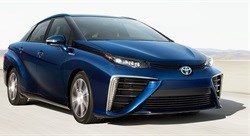TOKYO: Toyota will give away thousands of patents for its fuel-cell cars, it said recently, in an effort to encourage other automakers into the new industry.
The world's largest vehicle maker said it will allow royalty-free use of about 5,680 patent licences, including 1,970 related to fuel-cell stacks and 3,350 concerning fuel-cell system control technology.
The firm also said the free patent licences will include about 290 items related to high-pressure hydrogen tanks.
The cost-free licences will be allowed "through the initial market introduction period" of fuel cell vehicles (FCV), which the company expects to last until about 2020.
Toyota will also open about 70 patent licences related to hydrogen stations - the equivalent of gas stands for internal combustion vehicles, and a vital link in the chain for drivers - indefinitely for manufacturers and operators.
"By allowing royalty-free use of FCV-related patent licences, Toyota is going one step further as it aims to promote the widespread use of FCVs and actively contribute to the realisation of a hydrogen-based society," the automaker said in a statement.
The announcement came after Toyota last month rolled out the world's first mass market fuel-cell car - the four-door Mirai sedan - in Japan.
The car - whose name means "future" in Japanese - will hit the US and some European countries, including Britain, Germany and Denmark, in 2015, Toyota has said.
It hopes to sell more than 3,000 units of the car by the end of 2017 in the United States, and up to 100 annually in Europe.
The Holy Grail of green cars
Fuel-cell cars are seen as the Holy Grail of green cars as they are powered by a chemical reaction of hydrogen and oxygen, which produces nothing more harmful than water at the point of use.
But a limited driving range and lack of refuelling stations have hampered development of fuel-cell and their cousin, all-electric cars, which environmentalists say could play a vital role in cutting greenhouse gas emissions and slowing global warming.
The Mirai can travel about 650 kilometres (400 miles) without refuelling, some three times further than an electric car, and its tank can be filled in a few minutes like gasoline engine vehicles, according to Toyota.














































